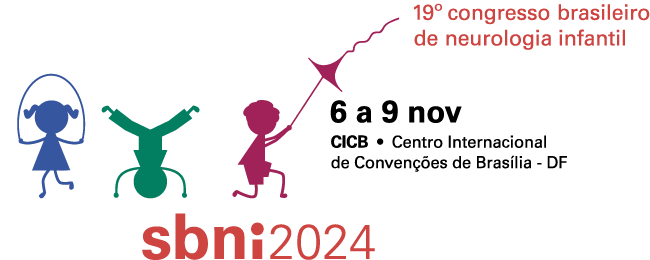Dados do Trabalho
Título
IMPACTS OF THE COVID-19 PANDEMIC ON THE OCCURRENCE OF EPILEPTIC SEIZURES IN PATIENTS WITH CONGENITAL ZIKA SYNDROME MONITORED AT OSWALDO CRUZ UNIVERSITY HOSPITAL IN RECIFE-PE
Introdução
Since it began in 2019, the COVID-19 pandemic has spread globally, with particularly worrying consequences for children with epileptic syndromes, a common neurological disorder that affects up to 10% of the population throughout their lives, who are at greater risk of seizure exacerbation during acute viral infections. The restriction in specialized care, coupled with the difficulty in accessing medication and therapies, has increased the anxiety of caregivers and the risk of early discontinuation of treatment, resulting in greater recurrence of seizures. Telemedicine has been adopted to mitigate these challenges and has been well received in developed countries but has faced obstacles in underdeveloped countries due to technological and internet access limitations.
Objetivo
Given this significance, the aim of this study was to describe the impact of the COVID-19 pandemic on the incidence of epileptic seizures and on access to specialized medical services, complementary tests and anti-crisis drugs for patients with Congenital Zika Syndrome.
Método
This was a retrospective cross-sectional observational study carried out on patients monitored by the Microcephaly Epidemic Group Research - Pediatric Cohort (MERG-PC), using a structured questionnaire between August and December 2022.
Resultados
A total of 49 children with microcephaly due to Congenital Zika Syndrome were assessed, with an average age of 6 years. More than 40% of the children had difficulties acquiring anti-crisis drugs for chronic use. Fifty-nine percent of the patients did not have routine neuropediatric consultations during 2020 (the peak year of the pandemic). Despite this, there was no worsening in seizure frequency. The COVID-19 vaccination rate was 80% in the sample. Only 12.2% were affected by COVID-19, of which 2 were not vaccinated. Among those affected, 2 required hospitalization in an intensive care unit (ICU), 1 of which was unvaccinated.
Conclusão
The occurrence of COVID-19 did not lead to fatal outcomes or alter the frequency of epileptic seizures among those studied. It can be seen that the incidence and behavior of COVID-19 in children with SZC was similar to that of the general population of the same age group and had no influence on the frequency of epileptic seizures. Despite the significant repercussions on follow-up and the difficulty in acquiring anti-crisis drugs, the COVID-19 pandemic has not led to a change in the frequency of epileptic seizures in the SCZ patients studied in this article.
Referências
1. Dong Y, Mo X, Hu Y, Qi X, Jiang F, Jiang Z, et al. Epidemiology of COVID-19 Among Children in China. Pediatrics. 2020 jun; 145(6).
2. Aledo‐Serrano Á, Mingorance A, Jiménez‐Huete A, Toledano R, García‐Morales I, Anciones C, et al. Genetic epilepsies and COVID‐19 pandemic: Lessons from the caregiver perspective. Epilepsia. 2020 maio 18; 61(6): 1312-1314.
3. Dhiman S, Sahu PK, Reed WR, Ganesh GS, Goyal RK, Jain S. Impact of COVID-19 outbreak on mental health and perceived strain among caregivers tending children with special needs. Research in Developmental Disabilities. 2020 Dez; 103790(107).
4. McElroy-Cox C. Caring for patients with epilepsy. The Nurse Practitioner. 2000 Jan; 32(10).
5. Alves LV, Cruz DDCS, van der Linden AMC, Falbo AR, Mello MJGd, Paredes CE. Epileptic seizures in children with congenital Zika virus syndrome. Rev. Bras. Saude Mater. Infant. 2016; 1(16).
6. Eickmann SH, Carvalho MDCG, Ramos RCF, Rocha M W, Van der linden V, da Silva PFS. Síndrome da infecção congênita pelo vírus Zika: Cadernos de Saude Publica; 2016.
7. Aledo-Serrano Á, Mingorance A, Jiménez-Huete A, Toledano R, García-Morales I, Anciones C, et al. Genetic epilepsies and COVID-19 pandemic: Lessons from the caregiver perspective. Epilepsia. 2020 Abr; 61(6).
8. Hixson JD. Stopping Antiepileptic Drugs: When and Why? Current Treatment Options in Neurology. 2010 Jun;(12).
9. Beniczky S, Husain A, Ikeda A, Alabri H, Cross JH, Wilmshurst J, et al. Importance of access to epilepsy monitoring units during the COVID-19 pandemic: consensus statement of the International League Against Epilepsy and the International Federation of Clinical Neurophysiology. ILAE & IFCN consensus statement. 2021 Agosto; 23(4).
10. Wirrell EC, Grinspan ZM, Knupp KG, Jiang Y, Hammeed B, Mytinger JR, et al. Care Delivery for Children With Epilepsy During the COVID-19 Pandemic: An International Survey of Clinicians. Journal of Child Neurology. 2020 jul; 35(13).
11. Casares M, Wombles C, Skinner HJ, Westerveld M, Gireesh ED. Telehealth perceptions in patients with epilepsy and providers during the COVID-19 pandemic. Epilepsy & Behavior. 2020 jul; 1(12).
12. Epilepsy care during the COVID-19 pandemi. Epilepsia. 2021 agosto; 00(1-11).
Palavras Chave
Coronavirus infections; Zika virus; epilepsy
Área
Epilepsias
Autores
HELLYSSON PHYLLIPE FIRMINO CAVALCANTI, ANNY PALLOMA QUEIROS RAMOS, HENDERSSON EDWARD FIRMINO CAVALCANTI, MARIA DURCE COSTA GOMES CARVALHO, PAULA FABIANA SOBRAL DA SILVA
